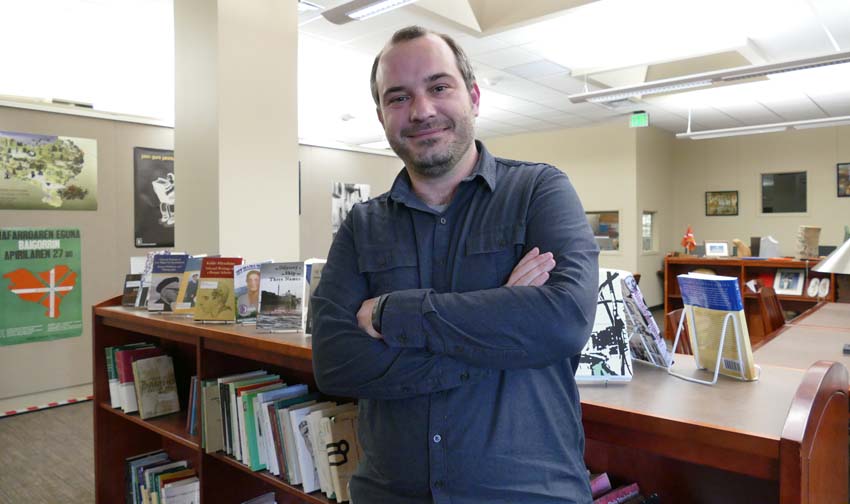Joseba Etxarri. He studied History at the University of Deusto to later complete two post-docs, in Basque Studies and Technical Documentation, while working for several years at Eusko Ikaskunza and Euskomedia. He has had two aunts who lived in North America, but this is the first time that he has had a chance to really get to know the Diaspora and the US, direct-immersion, in an entity like the Basque Library and the Center for Basque Studies in Reno, a reference in the world of the Diaspora and Basque culture abroad, a Basque showcase, above all for the international public and the academic world whose work language is English. We spoke to Iñaki Arrieta, who last Tuesday celebrated his first three months in Reno.
You seem excited here. You are facing a profesional as well as personal challenge.
-I am still getting my footing, but i can say that until now, I am thrilled and I really enjoy my job. It is true that everything here is different, but that also makes it very attractive. I feel like the city has a special touch; one drawback is that you have to have a car to get around, but on the other hand it is surrounded by beautiful mountains and landscapes that I would call impressive. In regards to work, I am still in the adapting phase to how things work here, but they have welcomed me very warmly and the work environment is fantastic. As a family we are very comfortable as well. I came with my wife, Eli (Etxetxikia), and our three year-old daughter Elaia, who has begun preschool and comes home singing her first songs in English. The time before coming was probably more difficult, the unknown, and wondering how we might adapt, find a house etc. than what has followed.
Introduce us to the library that you are now the Basque librarian for.
-That definition is cliché, but I think that saying that it is the main library on Basque topics outside of the Basque Country that emphasizes on the Diaspora, is a good definition. Last month it was officially renamed to bring attention to the relevant role played by bibliographer Jon Bilbao Azkarreta (Cayey, Puerto Rico, 1914 - Vitoria-Gasteiz, EH, 1994) in its creation and in its beginning stages. I would say that the Jon Bilbao Basque Library is a referential resource in the international panorama regarding the Basques, their reality, and contributions of Basques all over the world. We have 33,000 volumes and have an ample archive that contains thousands of documents, posters, photos, videos, multimedia material, etc. Our main objective is to serve students, professors and researchers from UNR, as well as from other US universities and those in the Diaspora. In fact, we hope to become the institutional memory of our Diaspora, always in close collaboration with Basque institutions, academic and administrative. We are called to work to create a Basque showcase for the world, as a bridge and presenters of the Basque reality in its various aspects, particularly to the English-speaking world.
What can a Basque researcher find in Reno that he/she can find in the Basque Country?
-The first thing that comes to mind is peace, and the appropriate atmosphere. Here the atmosphere itself is helpful, it is suited for research supported by mediums and an important infrastructure, when it comes to using our holdings related to Basque themes, or other topics in our main library, as well as resources from other universities that we can acquire through our network. Along with that, and not to our credit, anyone coming here usually leaves other work behind in the Basque Country, and so theye are able to dedicate themselves totally to research, supported by these means and the facilities that we have been referring to. Our challenge is to progress in this network, establish new bridges and improve the present ones, at the heart of our university as well as beyond with other domestic libraries as well as those in the Diaspora and Euskal Herria. Next week I will be traveling to Boise to Boise State University to meet with its directors as well as those at the Basque Museum and Cultural Center.
Who uses the library?
-On the one hand, there are the ones that work physically here, and on the other, they are people who work with us on the internet, or via email, or who contact us through other means. The majority are researchers, from here as well as from Basque Country universities, or from other places, working on very different disciplines, like history, anthropology, art….We also have external requests, many from the Diaspora, about the Basque Country, genealogy….The last one I responded to today was a request for a bibliography on the nature of the symbolism of the Tree of Gernika, if I’m not mistaken, that came from Holland.
Reno will participate in the 50th Durango Book Fair that begins today.
-Daniel Montero, Publications Editor for the Center for Basque Studies has already left, along with William Douglass. Also this year with the bonus of Joseba Zulaika being awarded the Euskadi Prize 2015, we are stronger than ever and that will resonate at this year’s stand.






 Send to a friend
Send to a friend Add comment
Add comment








